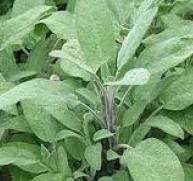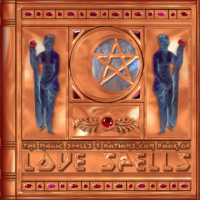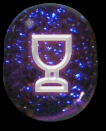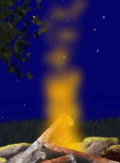Sage
A well-known monkish line about it ran to this effect: Cur moriatur homo cui Salvia crescit in horto? "Why should a man die whilst Sage grows in his garden?" And even at this time, in many parts of England, the following piece of advice is carefully adopted every year: "He that would live for aye Must eat Sage in May."
Added Dec 1, 2010
| 5,708 Reads
Our garden Sage, a familiar occupant of the English herb bed, was formerly celebrated as a medicine of great virtue. This was the Elalisphakos of the Greeks, so called from its dry and withered looking leaves. It grows wild in the South of Europe, but is a cultivated Herbal Simple in England, France, and Germany. Like other labiate herbs it is aromatic and fragrant, because containing a volatile, camphoraceous, essential oil. All parts of the plant have a strong-scented odour, and a warm, bitter, astringent taste. The Latin name, Salvia, has become corrupted through Sauja, sauge, to Sage, and is derived from salvere, "to be sound," in reference to the medicinally curative properties of the plant. A well-known monkish line about it ran to this effect: Cur moriatur homo cui Salvia crescit in horto? "Why should a man die whilst Sage grows in his garden?" And even at this time, in many parts of England, the following piece of advice is carefully adopted every year: "He that would live for aye Must eat Sage in May." During the time of Charlemagne, the school of Salerno thought so highly of Sage that they originated the dictum quoted above of Saracenic old pharmacy, but they wisely added a second line:-- "Contra vim mortis non est medicamen in hortis." The essential oil of the herb may be more readily dissolved in a spirituous than in a watery vehicle. Of this, the active principle is "salviol," which confers the power of resisting putrefaction on animal substances; whilst the bitterness and condimentary pungency of the herb enable the stomach to digest rich, luscious meats and gravies, if it be eaten therewith. Hence has arisen the custom of stuffing ducks for the table, and geese, with the conventional Sage and onions. Or there is no better way of taking Sage as a stomachic wholesome herb than by eating it with bread and butter. In Buckinghamshire a tradition maintains that the wife rules where Sage grows vigorously in the garden: and it is believed that this plant will thrive or wither, just as the owner's business prospers or fails. George Whitfield, when at Oxford (1733), took only Sage-tea, with sugar, and coarse bread. Old sayings tell of the herb, as Salvia salvatrix; naturoe conciliatrix; and the line runs:-- "Salvia cum rutâ faciunt tibi pocula tuta." recommending to plant Rue among the Sage so as to keep away noxious toads. The Chinese are as fond of Sage as we are of their fragrant teas; and the Dutch once carried on a profitable trade with them, by exchanging a pound of Sage leaves for each three-pound parcel of tea. It was formerly thought that Sage, if used in the making of cheese, improved its flavour. "Marbled with Sage the hardening cheese she pressed." --Gay. "Sage," says Gerard, "is singular good for the head and brain; it quickeneth the senses and memory; strengtheneth the sinews; restoreth health to those that hath the palsy; and takes away shaky trembling of the members." Agrippa called it "the holy herb," because women with child, if they be likely to come before their time, "do eat thereof to their great good." Pepys, in his well-known Diary says, "between Gosport and Southampton we observed a little churchyard where it is customary to sow all the graves with Sage." In Franche Comte the herb is supposed to mitigate grief, mental and bodily. "Salvia comfortat nervos, manuumque tremorem Tollit; et ejus ope febris acuta fugit." "Sage helps the nerves, and by its powerful might Palsy is cured, and fever put to flight." But if Sage be smelt for some time it will cause a sort of intoxication, and giddiness. The leaves, when dried and smoked in a pipe as tobacco, will lighten the brain. In Sussex, a peasant will munch Sage leaves on nine consecutive mornings, whilst fasting, to cure ague. A strong infusion of the herb has been used with success to dry up the breast milk for weaning; and as a gargle Sage leaf tea, when sweetened with honey, serves admirably. This decoction, when made strong, is an excellent lotion for ulcers, and to heal raw abrasions of the skin. The herb may be applied externally ill bags as a hot fomentation. Some persons value the Wormwood Sage more highly than either of the other varieties. In the Sage flower the stamens swing round their loosely-connected anther cells against the back of any blundering bee who is in search of honey, just as in olden days the bag of sand caught the shoulders of a clumsy youth when tilting at the Quintin. Wild Meadow Sage (Salvia verbenaca), or Meadow Clary, grows in our dry pastures, but somewhat rarely, though it is better known as a cultivated herb in our kitchen gardens. The leaves and flowers afford a volatile oil, which is fragrant and aromatic. Some have attributed the name Salvia sclarea, Clary (Clear eye) to the fact of the seeds being so mucilaginous, that when the eye is invaded by any small foreign body, their decoction will remove the same by acting as an emulsion to lubricate it away. The leaves and flowers may be usefully given in an infusion for hysterical colic and similar troubles connected with nervous weakness. Also they make a pleasant fermented wine. The Wood Sage is the Wood Germander, Teucrium scorodinia, a woodland plant with sage-like leaves, containing a volatile oil, some tannin, and a bitter principle. This plant has been used as a substitute for hops. It was called "hind heal" from curing the hind when sick, or wounded, and was probably the same herb as Elaphoboscum, the Dittany, taken by harts in Crete. A snuff has been made from its powder to cure nasal polypi: also the infusion (freshly prepared), should be given medicinally, two tablespoonfuls for a dose: or, of the powder, from thirty to forty grains. The name "Germander" is a corruption from Chamoedrys, chamai, ground, and drus, oak, because the leaves are like those of the oak.
Added Dec 1, 2010
| 5,708 Reads
Share The Magic ...
The GoE MONEY!!! Course - A Course In Real MONEY MAGIC!
|





















